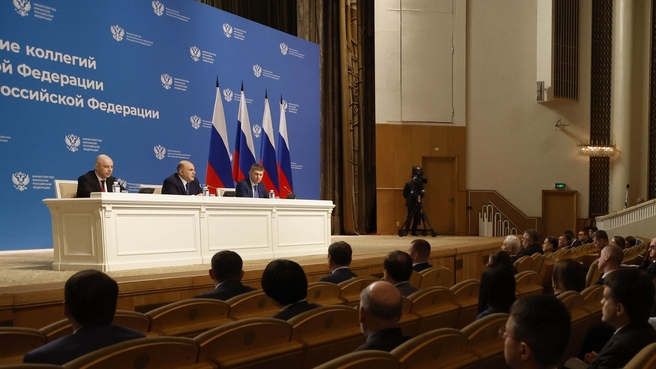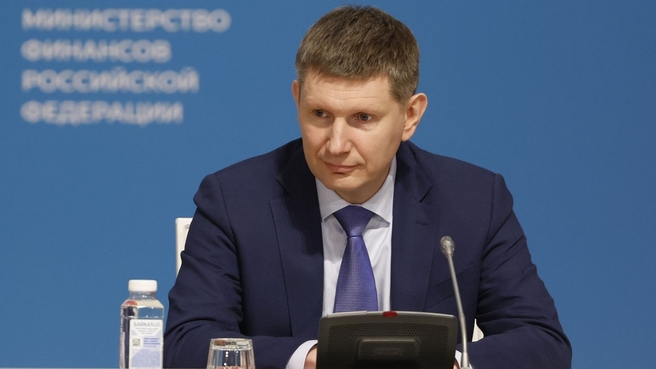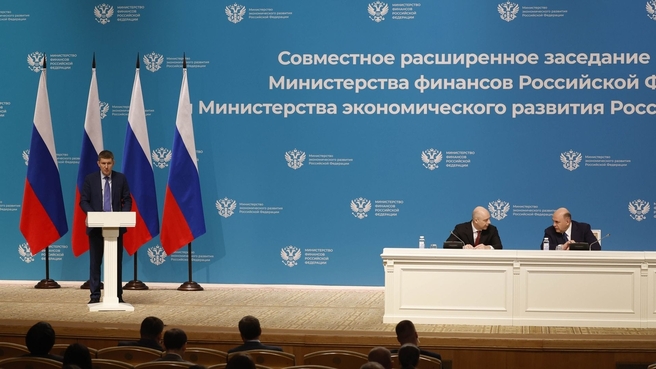Mikhail Mishustin took part in the joint Ministry of Economic Development and Ministry of Finance board meeting.
Excerpts from the transcript:
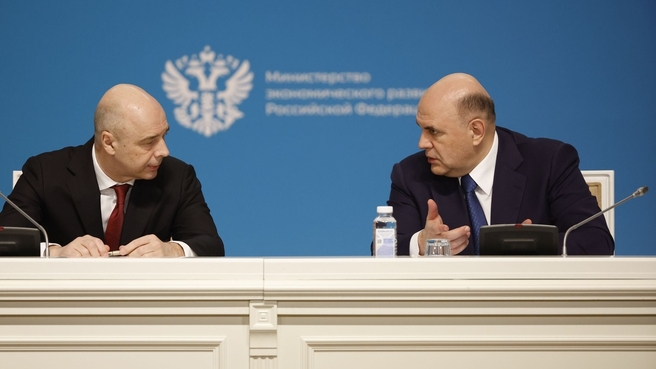
The Ministry of Finance and the Economic Development Ministry hold an expanded board meeting with Minister of Finance Anton Siluanov
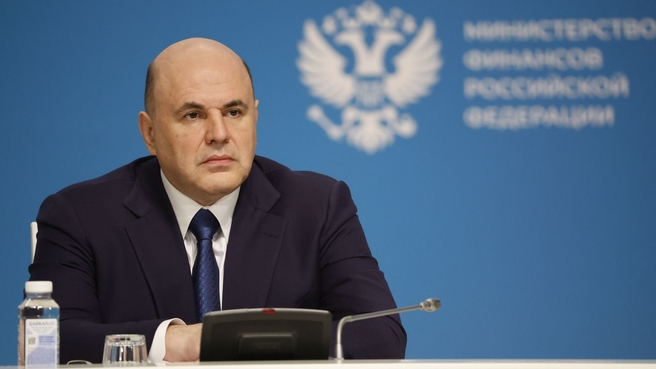
Mikhail Mishustin at the Ministry of Finance and the Economic Development Ministry expanded board meeting
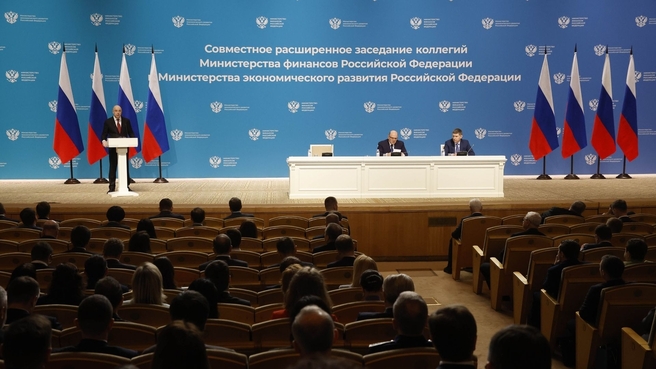
Finance Minister Anton Siluanov’s report at the expanded board meeting of the Ministry of Finance and the Economic Development Ministry
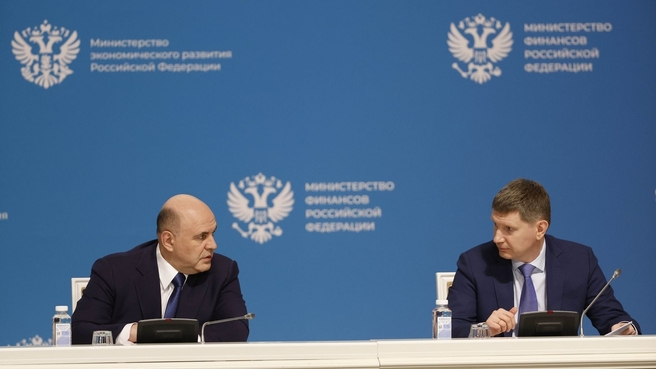
The Ministry of Finance and the Economic Development Ministry hold an expanded board meeting with Minister of Economic Development Maxim Reshetnikov
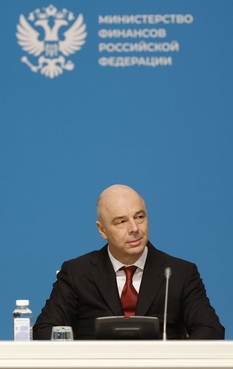
Minister of Finance Anton Siluanov at the expanded board meeting of the Ministry of Finance and the Economic Development Ministry
Expanded board meeting of Ministry of Finance and Economic Development Ministry
Mikhail Mishustin: Mr Siluanov, Mr Reshetnikov, colleagues.
Today we will review last year’s performance of the most important, key ministries: the Ministry of Finance and the Ministry of Economic Development. We will also discuss the goals that we need to address in the near future.
This is our first time meeting in this format. In the past three years, we have had to make a lot of operational, even emergency decisions. First, to support people and businesses during the pandemic, then to adapt the economy and citizens of Russia to the consequences of the unprecedented sanctions pressure from the West.
Most experts believe that we have done well with the main challenges. As I said in my report to the State Duma, the inevitable recession was moderate last year. Starting from the second half of the year, we managed to gradually return the economy to a growth trajectory. As a result, the gross domestic product even exceeded the 2019 level.
Our results are also recognised by foreign analysts. For example, the International Monetary Fund has recently improved its forecast for Russia again.
I would like to take this opportunity to thank all those present in this hall and our colleagues in the field for your hard work. Many decisions were made almost in real time. The preparation of documents took only a few days, and sometimes even hours. This made it possible for our financial system and economy to survive and continue to develop. This is the great achievement of your ministries.
Now we must move on and address the six key goals that the President has set for us for this year: improving the welfare of our citizens and promoting and encouraging population growth, strengthening technological sovereignty and achieving financial sovereignty, moving the development of transport, communal and social infrastructure forward, and building up ties with friendly countries while searching for new international partners.
The main thing in the course of this work is to redouble our efforts on medium- and long-term issues, primarily within the framework of the national goals set by the President.
This will require even more coordinated work at all levels, including the development of industry, entering promising markets, and expediting the creation of new infrastructure and new logistics.
There are already some positive changes here. Domestic energy resource exports have been reoriented towards China, India, other countries in the Asia-Pacific region, as well as some African countries. In the non-commodity segments, Russian businesses are effectively rebuilding their business models and their production chains, and are attracting new suppliers, mastering the production of the necessary components, and gradually filling niches that foreign companies left when leaving our market.
We are supporting the development of high-tech industries, mainly cyber technology and radio electronics, which will increase Russia’s capabilities in these critical industries.
We are also continuing to simplify the tax and customs procedures for our businesses.
At the same time, it is, of course, important to maintain the stability of the financial system despite the actions of unfriendly countries. Obviously, the pressure on Russia is unlikely to ease anytime soon.
The government will continue to pursue a responsible budgetary policy, which can be seen in the decline of annual inflation rates, something we witness at the beginning of this year.
We expect that as the adaptation period ends, we will be able to reach the parameters of the “budget rules” as soon as 2025, which will help strengthen confidence in economic policy in the long run. And, of course, it will help reaffirm the stability of our system, ensure the availability of private credit as a resource for development, of course, all while maintaining the current funding priorities. These are issues of Russia’s security, social support for vulnerable categories of people, technological development, infrastructure expansion and the integration of our new regions.
When strengthening our financial sovereignty, we need to ensure the growth of rouble loans and also replace, to the extent possible, the foreign capital that left.
The Government has reformatted a number of instruments to distribute risks between investors and the state. This applies to development institutions guarantees, agreements on protecting and encouraging investment, and a project financing factory.
Last year Russia adopted a strategy for developing its financial market until 2030. Its implementation will give our people even more opportunities for making money and provide more resources to businesses for launching promising projects. This will promote positive changes in many sectors and enhance opportunities for attracting much-needed long money into the economy, in part, by implementing a programme of long-term private savings, the drafting of which is about to be completed. We are also helping to increase the investment potential of our regions. On the President’s instruction, we replaced 720 billion roubles worth of expensive market borrowings with budget loans. The regions saved over 65 billion roubles on servicing the national debt and spent the money on other purposes, in part, on raising their investment appeal.
This year, the Government will pursue another important task – priority development of transport, utility and social infrastructure. Overall, the regions will receive up to 180 billion roubles in treasury loans for these purposes.
Colleagues!
In conclusion, I would like to focus on one important moment. The sustainability of the economy rests on the nature of our market, and we must maintain and strengthen the relevant institutions in our country for this reason. Despite attempts to curb Russia’s development, we remain open to investors and global trade. We need to continue raising the efficiency of our budget expenses. Last year, the state largely supported investment. Now we must work harder to expand private initiatives.
Federal and regional agencies should not replace businesses. We must build infrastructure facilities that will make a greater contribution to our economic growth.
We should also clearly define how newly built facilities will function and be funded. We must have a transparent and understandable system for assessing their performance. Of course, we need to prevent excessive expenses and losses.
However, we should realise that the private sector cannot cope with some industries, for example, aircraft manufacturing. The state should bear the main burden of this support. There is a range of industries like this.
We should also continue reducing expenses, including administrative costs; we need to further develop control and supervisory reform, and simplify licensing procedures for businesses.
